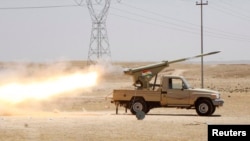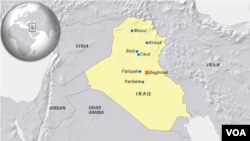Sectarian tensions continue to erode hope that Iraq’s political factions can come together. The United States remains committed to a unified Iraq, even as Iraq looks to U.S. rivals for help.
Another day passes and the rift between Iraq’s Shi’ites, Kurds and Sunnis deepens even more.
Friday, Kurdish fighters, the peshmerga seized two oil fields near the northern city of Kirkuk, following an earlier announcement by Iraq’s Kurdish leaders that they would boycott Shi’ite Prime Minister Nouri al-Maliki's Cabinet meetings.
Meanwhile, a car bomb in the Kurdish-controlled city of Kirkuk in northern Iraq has killed at least 25 people and wounded 25 others.
The dead include civilians and Kurdish soldiers manning a checkpoint.
The blast shattered windows in nearby homes. No one has claimed responsibility.
In Washington, White House spokesman Josh Earnest said the U.S. has no intention of giving up on a unified Iraq.
“Iraq’s political leaders should come together and unify that country in the face of the threat posed by ISIS. And that will continue to be the message that we send not just publicly but also privately in the ongoing conversations," said Earnest.
A U.S. State Department official said despite “incitement coming from some alleged tribal leaders” in the Kurdish north, the biggest threat remains militants with the Islamic State of Iraq and the Levant.
The U.S. has been providing Iraq’s forces with rifles, ammunition, missiles and surveillance; but, Baghdad wants airstrikes and has been turning elsewhere for help.
“We are aware of the Iranian and Russian efforts to help the Iraqis but we are not involved in coordinating any missions," said Defense Secretary Chuck Hagel.
U.S. officials say both countries have been supplying Iraq with Russian-made fighter jets and that some have flown what they say is “a small number” of attacks against ISIL targets. They add it is their understanding that Iraqi pilots have been at the controls.





